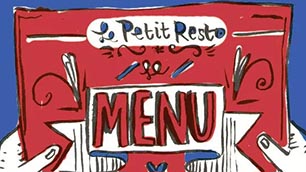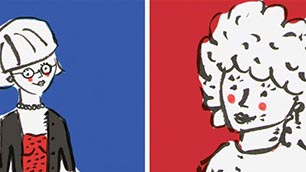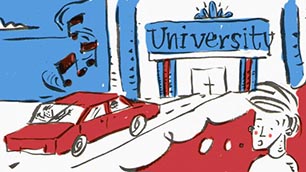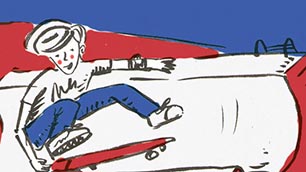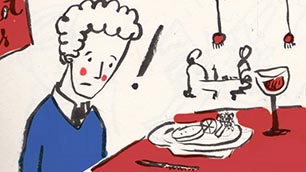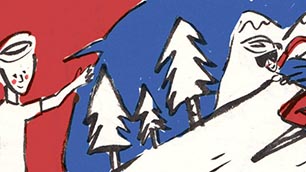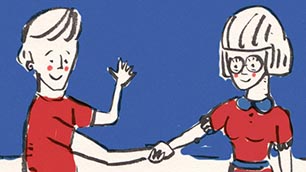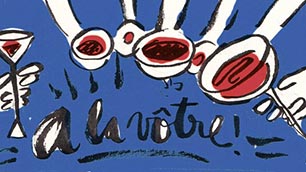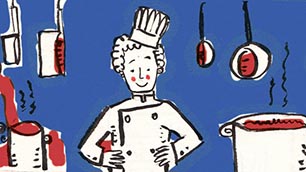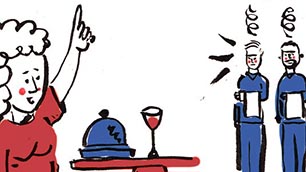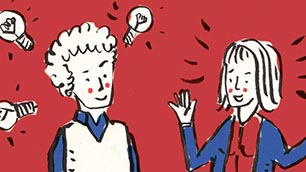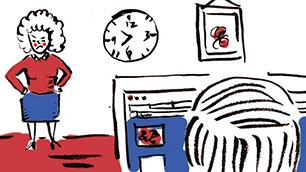BASIC VERB NEGATION
Basic negation is formed by placing
ne ... pas around the conjugated verb.
Ne becomes
n’ in front of a verb starting with a vowel or a mute
h.
Examples:
| Nous ne sommes pas en classe ce matin. |
| Elles ne sont pas françaises. |
| Tu n’as pas l’accent anglais. |
| Je n’ai pas l'énergie de courir un marathon. |
| Vous n'êtes pas invités ? |
INDEFINITE ARTICLES
Last time, we learned that few nouns can stand alone in French and that most need to be introduced by an article.
Un and
une are indefinite singular articles and correspond to ‘a/an’ in English. Today, we’ll learn the indefinite plural article
des. The indefinite plural article is always expressed in French, whereas its English equivalent, ‘some’ is often omitted.
Examples:
| Marc a une chambre à l'université. |
| Marc et Jean sont des camarades de chambre. |
| Jean a un bon professeur. |
| Ils ont des professeurs extraordinaires. |
The indefinite articles
un,
une,
des are replaced by
de or
d’ in a negative sentence. Note the change in the short dialogues below:
| - Marc, tu as un chien ? |
| - Non, je n’ai pas de chien, je suis à l'université. |
| - Vous avez des amis à l'université. |
| - Non, je n’ai pas d’amis. C’est ma première année ici. |
VERBE AVOIR
The verb avoir is irregular in the present tense. Listen carefully to the pronunciation of the
-s in the plural pronouns
nous,
vous and
ils/elles. This
-s is pronounced as a
/z/ to make the link with the vowel sound in the plural forms of avoir. This link, called liaison in French, is essential in distinguishing ils ont (they have) and ils sont (they are).
Avoir, like être, is also used as an auxiliary in compound tenses. We’ll learn in future lessons how to form other tenses using avoir and être as auxiliaries.
Here’s how to conjugate avoir:
AVOIR (to have) |
| J' | ai |
| Tu | as |
| Il/Elle | a |
| Nous | avons |
| Vous | avez |
| Ils/Elles | ont |
Besides ownership, avoir is used to express age, unlike the English equivalent, which uses “to be.”
Examples:
| - Jack, tu as des frères et soeurs ? |
| - Oui, j’ai une soeur et un frère. |
| - Quel âge ont-ils ? |
| - Ma soeur a 30 ans et mon frère a 25 ans. |
VERBE AVOIR and IDIOMATIC EXPRESSIONS
Avoir is also used to form many idiomatic expressions. Note that the English translation often uses the verb “to be” rather than “to have.” Here are just a few useful ones. We’ll learn more as we go.
| avoir besoin de | - to need |
| avoir peur (de) | - to be scared (of) |
| avoir faim | - to be hungry |
| avoir soif | - to be thirsty |
| avoir chaud | - to be hot |
| avoir froid | - to be cold |
| avoir raison | - to be right |
| avoir tort | - to be wrong |
Examples:
| Ils ont beaucoup d’amis. |
| Elle a un frère et une soeur. |
| J’ai 33 ans. |
| Vous avez des enfants ? |
| Nous avons besoin d'étudier ce matin. |
| Il a un rendez-vous avec ses collègues. |
| Tu as peur de l’examen. |
| Elles ont faim. |
| Tu as toujours raison et j’ai toujours tort. |
| Quel âge avez-vous ? |




